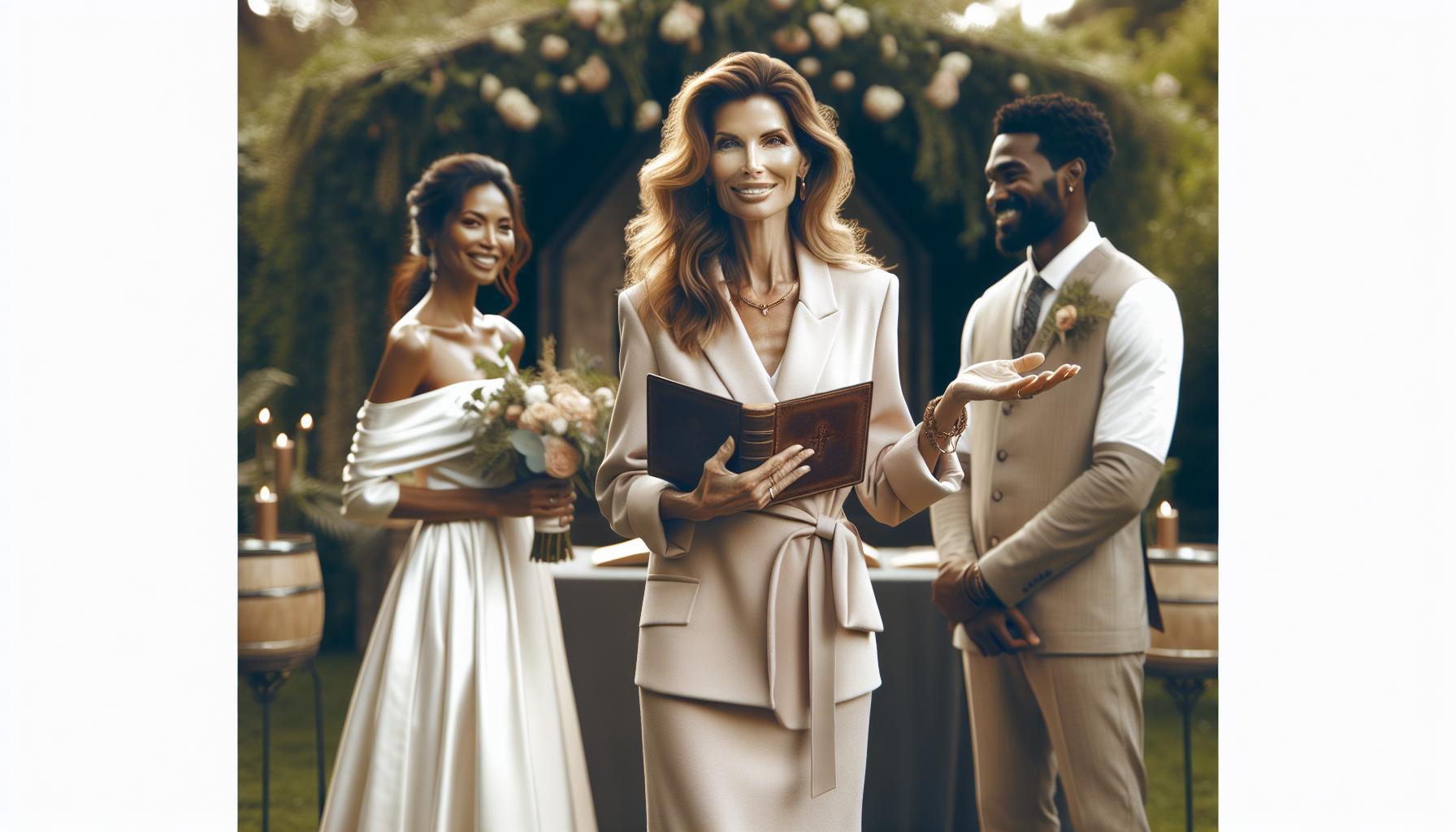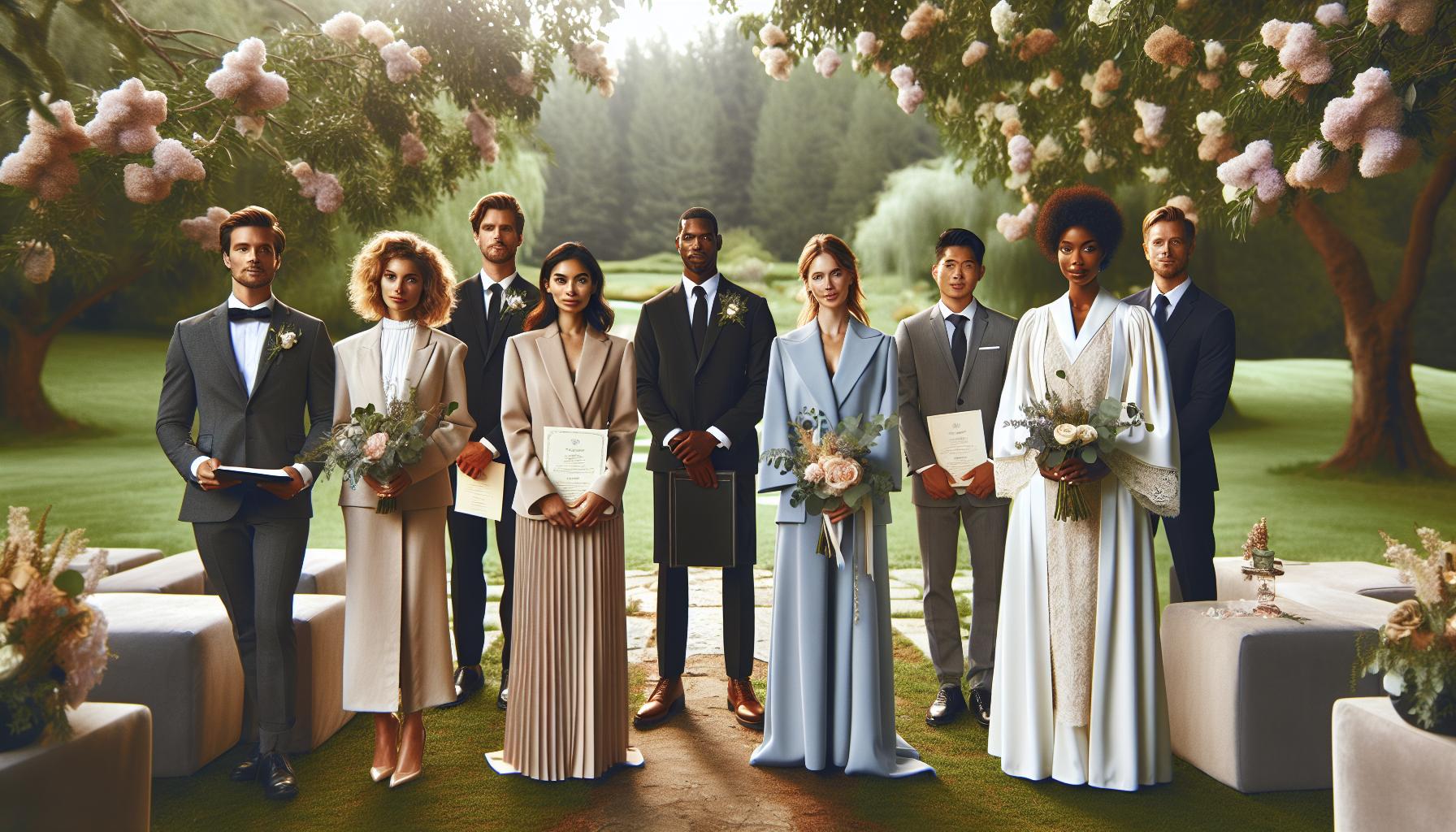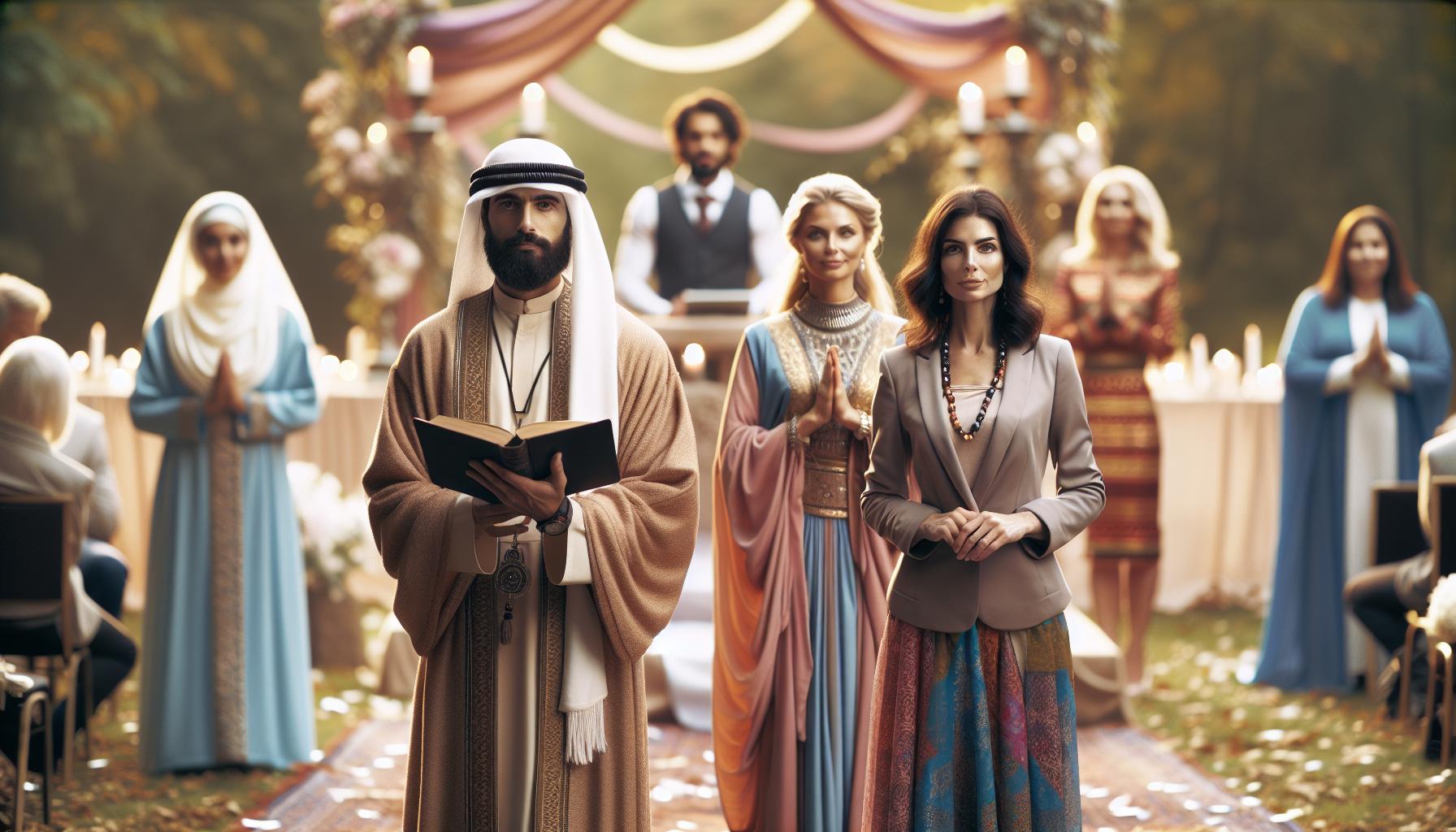Becoming a wedding officiant is a fulfilling journey that allows you to play a pivotal role in one of life’s most cherished celebrations. By officiating a wedding, you not only facilitate the union of two people in love but also bring joy and inspiration to their families and friends. If you have a passion for connecting with others and a desire to help couples create lasting memories, this guide will walk you through the essential steps to becoming a certified officiant. From understanding the legal requirements to crafting meaningful ceremonies that reflect couples’ unique stories, you’ll gain insights that are both practical and heartfelt. Read on to discover how you can embark on this rewarding path and help make love stories come to life.
Understanding the Role of a Wedding Officiant
Your wedding officiant is not just a functional part of the ceremony; they serve as the heart and soul of the occasion, guiding you and your guests through one of the most significant moments of your lives. This unique role blends the sacred and the personal, crafting a ceremony that reflects your love story, beliefs, and values. An officiant can be a traditional religious figure, a close friend, or a professional who specializes in creating personalized ceremonies that resonate deeply with couples. Their ability to connect with you both on an emotional level and to convey your story ensures that the ceremony is memorable and meaningful.
To truly understand the role of a wedding officiant, it’s essential to recognize their multifaceted responsibilities. From the planning stages to the moment you say “I do,” the officiant works closely with couples, helping them navigate the intricacies of the ceremony. This includes consultations to gather insights about your relationship, assistance in scripting vows, and ensuring all logistical aspects are handled smoothly. Moreover, the officiant must be well-versed in the legal requirements of marriage in your jurisdiction, ensuring that the ceremony complies with all necessary laws and that the marriage is officially recognized.
Moreover, officiants often play a significant role in setting the tone and atmosphere of the wedding. They can help create a warm and inviting space, making guests feel included and engaged in the proceedings. Whether through humor, personal anecdotes, or reflective moments, a skilled officiant can guide emotions, bringing out laughter and tears in equal measure. Their presence is crucial, establishing a seamless connection between the couple, their families, and friends as they celebrate this joyous milestone together. With such an impactful role, selecting the right officiant is a decision that calls for thoughtful consideration and connection.
Essential Qualifications for Becoming an Officiant
Becoming a wedding officiant is not just about having the right credentials; it’s about embodying a spirit of connection and celebration. Individuals who are drawn to this role must cultivate a unique blend of charisma, empathy, and organizational skills. A successful officiant is someone who can weave together the fabric of a couple’s love story with the rituals and customs that transform a significant moment into a cherished memory.
To embark on the path of officiating weddings, certain qualifications and personal attributes are essential. While specific requirements may vary by state or country, the foundational qualifications generally include:
Essential Skills and Attributes
- Communication Skills: An officiant must be articulate and confident in public speaking, ensuring that both the couple and their guests can hear and feel every word during the ceremony.
- Empathy and Understanding: The ability to connect emotionally with couples is crucial in creating a personalized ceremony that reflects their unique relationship.
- Cultural Sensitivity: Given the diverse nature of weddings, a successful officiant should be open and respectful of different beliefs, traditions, and practices.
- Organizational Skills: Managing the logistics of a ceremony, including timing and coordinating with other vendors, is vital for a smooth celebration.
Additionally, many officiants choose to obtain certification or training, which can further bolster their credibility and professionalism. Although certification is not always legally required, it demonstrates a commitment to understanding the legal aspects of officiating, as well as the art of crafting a meaningful ceremony.
Exploring different paths to becoming an officiant can also present opportunities to specialize in certain types of ceremonies, such as religious, civil, or themed weddings. By honing in on specific niches or styles, officiants can better market themselves and cater to couples looking for a unique experience.
Choosing to become a wedding officiant opens the door to a rewarding journey filled with joy and celebration. By investing in the essential skills and qualifications, individuals not only enhance their professional appeal but also deepen their ability to craft unforgettable moments for couples as they embark on their marital adventure.
Exploring Different Types of Wedding Officiants
The wedding officiant plays a pivotal role in shaping the couple’s special day, setting the tone for the ceremony and ensuring that every important moment is captured with heartfelt sincerity. As you consider becoming an officiant, it’s essential to understand that there are various types of officiants, each bringing their own flavor and style to wedding ceremonies. This diversity not only opens the door for personalization but also allows couples to choose someone who resonates with their vision for the big day.
Among the most common types of wedding officiants are religious officiants, such as priests, ministers, or rabbis, who are often chosen for traditional ceremonies held in houses of worship. These officiants can beautifully weave in specific religious rituals, blessings, and readings that reflect the couple’s faith. On the other hand, civil officiants or judges typically conduct non-religious ceremonies and may officiate in a variety of venues, providing a more secular approach that emphasizes personal vows and commitments.
For those looking for something distinctly unique, personalized or themed officiants cater to couples who want to make their wedding experiences one-of-a-kind. These officiants might specialize in destination weddings, elopements, or specific cultural traditions. By crafting a ceremony that incorporates personal stories, anecdotes, or even specific readings, they help the couple celebrate their individuality and relationship in a manner that resonates deeply with them and their guests.
As you contemplate the various paths to officiating, it’s worthwhile to hone in on the style that best matches your personality and strengths. Consider who you inspire and connect with most during such significant moments. Whether it’s through spiritual guidance, civil elegance, or playful storytelling, embracing the unique aspects of your officiating style will enable you to create unforgettable experiences for couples as they embark on the joyous journey of marriage.
The Certification Process Explained
Becoming a wedding officiant is an exciting journey that allows you to play a vital role in one of life’s most cherished celebrations. However, navigating the certification process can seem daunting. Understanding the steps involved can ease your path and help you embrace this meaningful vocation with confidence.
To become a certified wedding officiant, the initial step typically involves researching the requirements specific to your state or country, as regulations vary widely. Most jurisdictions require officiants to be at least 18 years old and to complete some form of official registration or certification. This often includes obtaining a license, which can usually be done through county clerks or local government offices. Some states may even have online processes that simplify registration.
Once you’re familiar with the legal requirements, consider enrolling in a training program offered by various organizations specializing in officiant training. These programs often provide insights into ceremony planning, vow writing, and effective public speaking. For instance, organizations like the Universal Life Church and American Marriage Ministries offer comprehensive courses that guide you through the nuances of officiating weddings, ensuring you are well-prepared for the honor of conducting ceremonies.
After completing any necessary training, you’ll typically need to apply for your officiant license, which may involve submitting proof of your training, paying a fee, and possibly passing a background check. Once licensed, remember to keep updated on any evolving local laws regarding officiating weddings to ensure you remain compliant.
Honing your skills as a wedding officiant is not merely about legality; it’s also about crafting a memorable experience for couples. Consider practicing your public speaking and learning how to compose heartfelt ceremonies that reflect the couple’s love story. This unique blend of legal preparation and personal touch will elevate your officiant journey, making each ceremony truly special.
Steps to Get Your Wedding Officiant Certification
To embark on the fulfilling journey of becoming a wedding officiant, it’s essential to follow a series of structured steps that will guide you through obtaining your certification. Each step brings you closer to the incredible opportunity of celebrating love and commitment with couples.
Start by researching the specific legal requirements in your area, as these can differ significantly from one location to another. Most jurisdictions require officiants to be at least 18 years old and to possess formal registration or certification. This often involves obtaining a license from a local authority, which may also necessitate attending a brief training or orientation session. It’s wise to check the relevant government websites for precise instructions or any available online application processes, which can streamline your journey.
Next, consider enriching your experience by enrolling in an officiant training program. Many organizations-such as the Universal Life Church and American Marriage Ministries-offer online or in-person courses tailored for aspiring officiants. These programs typically cover vital topics such as ceremony structuring, public speaking techniques, and personalized vow crafting. Engaging in this training not only helps you familiarize yourself with the rituals and customs of wedding ceremonies but also boosts your confidence when standing in front of the couple and their loved ones.
Once you have completed your training, you will need to apply for your officiant license. This process generally includes submitting proof of your training, paying an application fee, and possibly passing a background check. Upon receiving your license, it’s paramount to stay informed about any evolving regulations that pertain to wedding officiating in your area, ensuring you remain compliant with local laws.
Finally, remember that becoming a wedding officiant is not just about the legalities; it’s about heartfelt connections and creating lasting memories. Consider practicing public speaking skills and crafting unique ceremonies that reflect the couple’s journey. By weaving together legal preparation and personal flair, you’ll not only fulfill your role but also enrich the marriage ceremonies you conduct, making each occasion genuinely unforgettable.
Legal Requirements for Officiating Weddings
To navigate the journey of officiating weddings, understanding the legal requirements is crucial. Many couples look for officiants who not only resonate with their vision but also meet all necessary legal criteria. Each state or locality can have unique regulations, so it’s vital to be well-informed and compliant.
First and foremost, most jurisdictions mandate that officiants must be at least 18 years old. They typically require a formal registration or a license to conduct weddings legally. This means that you will need to obtain your officiant license from the appropriate local authority. The specific criteria can vary widely; some areas might require an application fee, proof of training, and even a background check, while others may have a more straightforward process. Therefore, checking with state or municipal government websites will provide you with accurate and tailored information regarding your area.
In addition to licensing, some regions may require officiants to attend an orientation session or a brief training program. While fulfilling legal requirements is non-negotiable, acquiring knowledge through these sessions will not only equip you with the necessary credentials but also enhance your confidence and public speaking skills. It’s worth noting that various organizations, like the Universal Life Church, offer online courses to assist aspiring officiants in meeting these requirements while educating them on best practices for conducting ceremonies.
Lastly, once you are licensed, staying vigilant about any changes in local laws is essential. Legal regulations can evolve, and being proactive ensures that your officiating remains above board. By embracing both the legal standards and the emotional significance of your role, you can create beautiful, memorable ceremonies that honor love in all its forms, making each wedding a unique and cherished celebration.
Best Practices for Conducting a Memorable Ceremony
A wedding ceremony is a profound moment that intertwines the lives of two individuals, marking the beginning of a shared journey. As the officiant, your role is not only to facilitate the legalities but also to create an atmosphere imbued with love, joy, and significance. From carefully choosing words to guiding emotions, every detail matters. Here are some best practices to ensure that the ceremony is both memorable and reflective of the couple’s aspirations.
To begin with, understanding the couple’s vision for their ceremony is crucial. Conducting a pre-wedding consultation allows you to gauge their preferences, values, and traditions. Here are essential points to cover during your discussions:
- Cultural Traditions: Many couples wish to incorporate elements from their cultural or religious backgrounds. Be respectful and open to including these traditions in the ceremony.
- Personal Touches: Encourage the couple to share personal stories, favorite quotes, or unique vows. These elements weave together their personal narrative and enhance the emotional significance of the ceremony.
- Visual and Environmental Aspects: Get to know the venue and its layout. Understanding how to utilize the space effectively can enhance the overall experience for both the couple and their guests.
Another vital aspect is your delivery on the day of the ceremony. Practice makes perfect, so rehearse the ceremony, ensuring you are familiar with the flow and timing. A calm demeanor encourages the couple and their guests to relax and focus on the moment. Consider incorporating the following:
Effective Delivery Tips
- Engage with the Audience: Make eye contact, smile, and use a warm tone. This helps connect with everyone present, creating a shared atmosphere of love and celebration.
- Clear Articulation: Speak clearly and at a natural pace. Avoid rushing; savor each meaningful moment, allowing the couple and guests to absorb the significance of your words.
- Mindful of Emotions: Be attuned to the emotions of the day. If guests or the couple become teary-eyed, don’t shy away from embracing those feelings; they are part of the ceremony’s beauty.
Finally, conclude the ceremony on a high note. Creating a powerful closing not only signifies the end of the formalities but also uplifts the spirit of the event. Use an enthusiastic tone when declaring the couple married, and invite everyone to celebrate their union, perhaps even leading into a joyful moment like a kiss or a special introduction as a married couple.
By embracing these practices, you set the stage for a ceremony that is not only legal but also heartfelt and memorable, leaving an indelible mark on the lives of the couple and their loved ones.
Building Your Wedding Officiant Brand
In a world where every couple desires a wedding ceremony that is as unique as their love story, establishing a strong brand as a wedding officiant can set you apart in this heartwarming industry. A well-crafted brand not only reflects your personality and philosophy but also resonates with couples searching for someone who will pour their heart into making their big day unforgettable. Think of your brand as the emotional connection that you establish with your clients; it’s about showcasing your authenticity, style, and commitment to serving couples with care.
To begin building your brand, reflect on what makes you unique as an officiant. Consider your personal story, beliefs, and the styles of ceremonies you resonate with most. Are you drawn to traditional weddings, intimate elopements, or perhaps a blend of cultural rituals? Once you identify your niche, communicate this clearly in your online presence. Create a professional website and social media profiles that encapsulate your essence through thoughtful descriptions, high-quality photographs, and testimonials from happy couples. Sharing videos or snippets of your ceremonies can also provide potential clients a glimpse into your style and approach.
Crafting Your Online Presence
Utilizing digital platforms effectively is crucial in today’s market. Here are practical steps you can take to enhance your online visibility:
- Engaging Website: Your website should be user-friendly, elegant, and informative. Include sections about your services, pricing, testimonials, and a gallery of past ceremonies.
- Active Social Media: Platforms like Instagram and Pinterest are perfect for sharing visually appealing moments from your ceremonies. Post behind-the-scenes stories and engage with your audience through polls and questions.
- Blogging: Write about your wedding officiant experiences, unique ceremony ideas, and advice for couples planning their wedding. This not only showcases your expertise but also improves your search engine visibility.
Additionally, networking is a powerful branding strategy. Attend wedding fairs, meet other vendors, and join local wedding groups. Collaborating with photographers, florists, and coordinators can provide you with mutual referrals and enhance your reputation within the wedding community. Don’t underestimate the power of word-of-mouth; happy couples will always recommend an officiant who brought joy to their ceremonies, becoming ambassadors for your brand.
Ultimately, is about ensuring that every couple feels a personal connection to you. By sharing your story and creating meaningful experiences, you can cultivate a reputation that not only attracts clients but also fosters a community of love and celebration. Celebrate the love stories you help weave together, and let that passion shine through your brand, making every wedding a beautifully unique affair.
Marketing Yourself as a Wedding Officiant
The journey to becoming a sought-after wedding officiant begins with a clear strategy for marketing yourself effectively in an increasingly competitive landscape. As couples embark on planning their dream weddings, having an officiant who resonates with their vision is vital. Highlighting your unique qualities, experiences, and capabilities can bridge the gap between you and your ideal clients, making it essential to craft a compelling marketing approach.
First, establishing a vibrant online presence is crucial. A user-friendly website that showcases your personality and services can make a powerful first impression. Ensure your site contains engaging elements like a biography, services offered, pricing structures, and a gallery showcasing past ceremonies, reflecting your distinct style. Additionally, testimonials from happy couples can significantly enhance your credibility. Consider including a blog where you share insights about the officiating process, ceremony ideas, and helpful tips for couples. This not only positions you as an expert but also improves your ranking in search engine results, allowing more couples to discover your services.
Utilizing Social Media Effectively
Social media platforms such as Instagram, Facebook, and Pinterest are invaluable tools for . Couple-centric content reigns supreme on these platforms; thus, sharing captivating images and videos from ceremonies can draw attention and engagement. Don’t shy away from showcasing behind-the-scenes content or sharing the stories of the couples you’ve worked with, as these personal touches cultivate a connection with potential clients. Create interactive content through polls or Q&A sessions related to wedding planning, positioning yourself as a supportive figure in their journey.
Networking within the wedding industry is another powerful marketing strategy. Attend local bridal fairs, collaborate with vendors like florists, photographers, and wedding planners, and engage in community events. Building relationships within the industry can lead to referrals and word-of-mouth marketing, which remains one of the most effective forms of attracting clients. Establishing partnerships with fellow wedding professionals not only builds your reputation but also provides an invaluable support system as you navigate your officiating journey.
By effectively combining these strategies-an inviting online presence, engaging social media, and robust networking-you can create a marketing approach that not only highlights your uniqueness as a wedding officiant but also connects deeply with couples seeking the perfect person to lead them into their happily ever after.
Tips for Crafting Personalized Wedding Ceremonies
Crafting a personalized wedding ceremony is an opportunity to create a magical experience that truly reflects the couple’s unique love story. Every relationship has its own distinct narrative, and as a wedding officiant, your role is to weave these elements into a heartfelt ceremony that resonates with all the attendees. Begin by having open conversations with the couple to understand their vision, values, and preferences. This deep dive into their relationship history sets the foundation for a meaningful ceremony that honors their journey together.
One effective approach is incorporating personal anecdotes and significant symbols. Ask them about key moments in their relationship-such as their first date, favorite activities, or challenges they’ve overcome-and consider using these stories to illustrate their bond. Integrating rituals, such as a unity candle, sand ceremony, or even a family heirloom, can further personalize the experience. These symbolic acts remind guests of the couple’s commitment while adding a visually striking element to the ceremony, making it memorable for everyone involved.
Engaging the Audience
While focusing on the couple, remember the audience’s role in the ceremony. Invite their participation through readings, music selections, or by encouraging their heartfelt responses during certain parts of the vows. This creates an atmosphere filled with love and support, as attendees feel more connected to the couple’s shared values and story. You might also suggest composing vows together, or allow each partner to express their love in their own words, adding depth and sincerity that formal vows might lack.
Ensure that the structure of the ceremony resonates with the couple’s style and preferences; whether they desire a traditional approach or something modern and casual, your adaptability will make the day feel smooth. Providing a structure that is inclusive of their backgrounds and special traditions is key. For instance, if one partner comes from a culture with specific customs, integrating them into the ceremony will reflect respect and understanding while enriching the experience for all present.
Ultimately, a personalized wedding ceremony is a testament to the love shared between two individuals. By working closely with the couple, engaging their guests, and honoring their background and preferences, you can create a memorable day filled with joy and celebration that lays a strong foundation for their married life ahead.
Expanding Your Skills: Continuous Learning for Officiants
As a wedding officiant, your journey doesn’t end once you’ve completed your certification; it marks the beginning of an exciting path filled with opportunities for personal and professional growth. Engaging in continuous learning is vital for providing couples with the most meaningful and memorable ceremonies. By expanding your skill set and staying updated on the latest trends, you can ensure that each wedding you officiate is an unforgettable experience that honors the couple’s unique love story.
One way to enrich your officiating skills is to participate in workshops or seminars focused on various aspects of wedding ceremonies. Topics might include ritual personalization, cultural practices, and even public speaking techniques. Seeking mentorship from experienced officiants can provide invaluable insights into the art of officiating, as you can learn from their experiences, challenges, and successes. Networking with others in the wedding industry, such as planners, photographers, and florists, can also expose you to a range of styles and preferences, helping you refine your own approach.
Additionally, consider obtaining certifications in specialized areas such as pre-marital counseling or conflict resolution. These skills are increasingly valuable as couples appreciate officiants who can offer support beyond the ceremony itself. Reading relevant literature, attending industry conferences, and even engaging in online courses about modern wedding trends and evolving social norms will keep you informed and adaptable in this dynamic field. Always aim to enhance your understanding of diversity in love and marriage, ensuring that you respect and celebrate all couples, regardless of background.
Lastly, feedback from couples is a golden opportunity for growth. After each wedding, ask for input to refine your techniques and approaches. By consistently reflecting on your experiences and integrating new knowledge, you can build not only a robust officiant skill set but also a strong reputation in the wedding community. The heart of your role is to foster connection and joy, so embracing lifelong learning enables you to create those enchanting moments that couples-and their loved ones-will cherish forever.
Frequently Asked Questions About Wedding Officiating
When considering a role as a wedding officiant, many aspiring officiants have questions that can pave their path to this fulfilling responsibility. The journey to become a wedding officiant is not only about legal qualifications but also about understanding the emotional tapestry that binds couples together on their special day. Below are some frequently asked questions that can guide you along this beautiful journey.
What qualifications do I need to become a wedding officiant?
While the specific qualifications vary by state and country, generally, you’ll need to check your local laws regarding officiating weddings. Some regions require officiants to be ordained through recognized organizations, while others may only require a simple appointment. Additionally, having strong public speaking skills and a compassionate disposition can significantly enhance your effectiveness in this role.
Do I need certifications to officiate weddings?
Certification is not universally required but can add to your credibility and reassure couples of your professionalism. Many officiants choose to obtain ordination from an online ministry or specialized wedding officiant training. Some also attend workshops to enhance their ceremony planning skills or learn about the various cultural traditions and rituals that can enrich a wedding ceremony.
How do I personalize a wedding ceremony?
Creating a personal touch for a wedding ceremony is essential for making the day memorable. Start by discussing the couple’s love story, including how they met and what makes their relationship special. Incorporate meaningful rituals or readings that resonate with them. This personal approach not only reflects their unique journey but also engages the guests, creating a warm and inviting atmosphere.
What should I consider when pricing my officiant services?
When setting your rates, take into account your experience, the complexity of the ceremonies you offer, travel distance, and the time spent on preparation. Being transparent about your pricing, including any additional fees for travel or customization, will build trust with the couples you serve. Offering packages that cater to different budgets can also attract a wider clientele.
By addressing these common questions, you can feel more prepared and confident in stepping into the role of a wedding officiant. Every wedding is a unique celebration of love, and being part of that moment is a privilege filled with joy, laughter, and sometimes tears of happiness. Embrace this opportunity to create unforgettable experiences that couples will cherish for a lifetime.
Q&A
Q: What qualifications do I need to become a wedding officiant?
A: To become a wedding officiant, you typically need to be at least 18 years old and possess a strong understanding of marriage laws in your area. While formal training isn’t always required, obtaining a certification can enhance your credibility and skills. Check local requirements for specific qualifications needed.
Q: How long does it take to get certified as a wedding officiant?
A: The time it takes to get certified as a wedding officiant varies by program, generally ranging from a few hours to several weeks. Online certification courses are available that allow you to complete training at your own pace, often culminating in a simple exam or submission of your materials.
Q: Can anyone officiate a wedding?
A: Technically, many people can officiate a wedding, but they must comply with local laws and regulations. Some jurisdictions allow friends or family members to officiate if they register with the state. It’s crucial to familiarize yourself with legal requirements in your area before proceeding.
Q: What is the role of a wedding officiant during the ceremony?
A: A wedding officiant’s role during the ceremony includes guiding the couple through their vows, managing the flow of the ceremony, and ensuring that all legal aspects of the marriage are fulfilled. Additionally, they may add personal touches to make the ceremony meaningful.
Q: How can I market myself as a wedding officiant?
A: To effectively market yourself as a wedding officiant, create a professional website showcasing your services, testimonials, and sample ceremonies. Utilize social media platforms, attend bridal shows, and network with wedding planners to reach potential clients. Building a strong online presence is key.
Q: What are the legal requirements for officiating a wedding?
A: Legal requirements for officiating a wedding vary by state or country. Generally, officiants must be authorized by the state to perform marriages, which may involve registering with a local government office. Ensure you’re familiar with local regulations and obtain any necessary permits.
Q: How much can I charge as a wedding officiant?
A: Wedding officiant fees can range from $100 to over $1,000, depending on experience, location, and services offered. Research local market rates and consider your experience level when setting your fees. Offering additional services like premarital counseling can justify higher rates.
Q: What should I include in my wedding officiant certification course?
A: A comprehensive wedding officiant certification course should cover essential topics such as understanding marriage laws, crafting personalized ceremonies, communication skills, and managing diverse wedding styles. Additionally, practical components like practice ceremonies can enhance learning.
Key Takeaways
Becoming a wedding officiant is not just a career choice; it’s an opportunity to help couples embark on one of the most significant journeys of their lives. Now that you understand the essential steps for certification, don’t hesitate any longer-take action today! If you’re still weighing your options or have specific questions, explore our detailed resources on license requirements and tips for leading a personalized ceremony that resonates with the couple’s vision.
We invite you to dive deeper into our guides on the importance of understanding wedding traditions and creating memorable ceremonies, or check out our vendor coordination advice to help couples realize their dream wedding. Don’t forget to subscribe to our newsletter for ongoing insights, useful tips, and updates that will enhance your journey as an officiant.
Your role as a wedding officiant is now just a decision away-embrace the experience and create lasting memories for the couples you serve. What are you waiting for? Start planning your path today!











